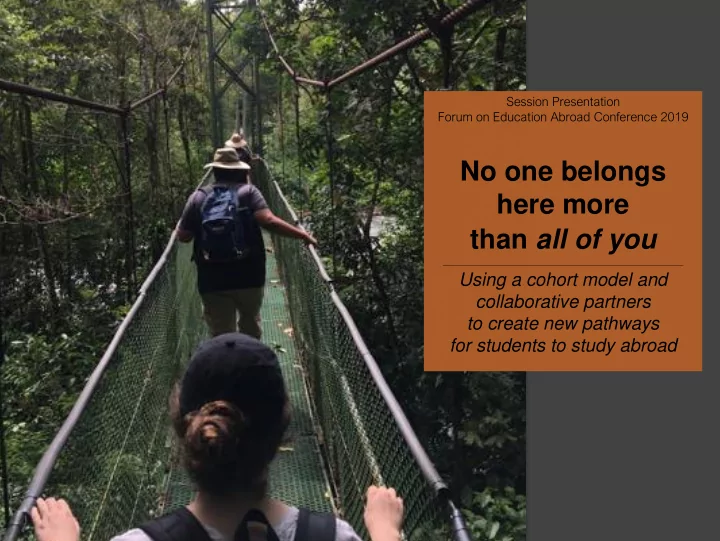

Session Presentation Forum on Education Abroad Conference 2019 No one belongs here more than all of you ______________________________________________________________ Using a cohort model and collaborative partners to create new pathways for students to study abroad
Introductions Devin Foxall, M.A. Michael Girsch, MAE Director of Institutional Relations Institutional Relations Manager Lisa Loberg, Ed.D. Lorenzo Ramirez, Ph.D. Director of Study Abroad Director, ALLIES in STEM
Behavioral Economics Engaging Groups to Improve Diversity Choice Architecture Game Theory Does it work... in theory?
ALLIES in STEM: Scholar demographics 1st Generation? Residential Status Low-Income? Student Type Gender Yes: 60% Commuter: 40% Yes: 70% Freshmen: 86% Female: 68% No: 40% Residential: 60% No: 30% Transfer: 14% Male: 32%
Cohort 1 • Participants • Locations • Programs
Reflections Did the ALLIES students consider studying abroad before the partnership? What are the reasons your ALLIES students cite for not following through, even with access to this opportunity?
" I felt my confidence in research increase. " ALLIES Student: Angelica Pasion ’21 Majors: Biology Program: SFS Costa Rica Research: Bio-acoustics
“ I thought medicine was the only thing to do with a Biology degree , and I began to worry that I was losing interest in becoming a doctor. My research abroad with SFS allowed me to see the animal behavior side of biology, and it sparked a passion . ” ALLIES Student: Amir Mejia ’21 Majors: Biology and German Program: SFS Costa Rica Research: Bio-acoustics
Identifying possible collaborations Unintended consequences and successes Lessons learned Student support
Identifying possible collaborations -> cohorts -> student groups -> grant-funded programs -> ____________________ What opportunities exist for your campus or organization?
Identifying possible collaborations -> potential study abroad program partners -> program features that address student needs -> academics that fulfill cohort requirements -> ____________________ How can you leverage your education abroad network and link potential partners for collaboration?
Unintended consequences and successes Opportunities to highlight study abroad in a new way New campus partners can encourage more students to study abroad Greater familiarity with study abroad office and its available support More students studying abroad increases retention for the institution
Unintended consequences and successes Unexpected professional development for campus partners: site visit to program location, gain advising expertise in a new area Involvement from other academic departments Address myths for campus colleagues and students who think they can’t study abroad ($$$, no time in the major, will delay graduation, lack of programs, etc). Framework for partnerships = more awareness and more support for students
Considerations for student success: avoiding pitfalls Anticipate ways to provide extra support - Carefully consider program fit - Articulate the benefits of study abroad - Guide during the application process - Customize pre-departure information - Normalize the FAQ’s - Account for family involvement - Intentionally connect students with past participants - Consider possible on-site needs Students return to campus empowered - Provide outlets and re-entry support
Group discussion Implications for your campus or organization: Cohorts to consider Ideas for future programming Feedback / Suggestions
Session presenters Devin Foxall, M.A. Michael Girsch, MAE Director of Institutional Relations Institutional Relations Manager Lisa Loberg, Ed.D. Lorenzo Ramirez, Ph.D. Director of Study Abroad Director, ALLIES in STEM
Recommend
More recommend